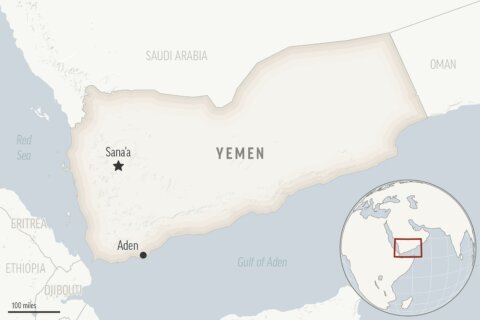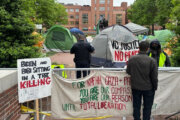KIRYAT SHMONA, Israel (AP) — For four years, Sivan Shoshani Partush recruited families for Kibbutz Malkiya, a community of around 400 that she calls her “little slice of heaven.” It wasn’t a hard sell: spacious homes, beautiful nature, paths winding through manicured lawns, and a slower pace of life than in Israel’s frantic cities.
The border with Lebanon is just 200 meters (650 feet) away. Partush would pass it on her daily runs, a feature of the landscape just like the view of the snow-topped Hermon Mountain in the winter.
“There was fear, but I got over it, because that’s the choice I made, because someone was protecting me,” said Partush. “But now there’s a feeling that no one is protecting us.”
Among approximately 60,000 Israelis evacuated from northern Israel after months of cross-border fighting, Partush and her children are staying temporarily in another kibbutz, and she isn’t sure if she wants to return to Malkiya. Nearly 91,000 people from south Lebanon have also been displaced.
Lebanon’s Hezbollah militant group began launching rockets towards Israel one day after Hamas-led militants stormed into southern Israel on Oct. 7, killing some 1,200 people, mostly civilians, and taking around 250 hostage. More than 31,000 people have been killed in Israel’s subsequent invasion of Gaza, according to Gaza’s Health Ministry. There has been near-daily violence along the Lebanon-Israel border and international mediators are scrambling to prevent an all-out war between Hezbollah and Israel.
The fighting has killed eight civilians and 11 soldiers in Israel. More than 200 Hezbollah fighters and about 40 civilians have died in Lebanon.
Defense Minister Yoav Gallant has said the Israeli military is concentrating on Gaza, but that Israel has a simple aim in Lebanon: to push Hezbollah away from the border, either by diplomacy or force.
So far, that hasn’t happened.
Israel said it has targeted 4,500 Hezbollah sites in the past five months. But Hezbollah’s well-stocked and deeply entrenched militants continue to launch rockets, and Israel said the militants have attempted to or have actually crossed the border half a dozen times.
Partush is grimly resigned to the reality that it may be a year before she can return home, if she ever goes back, and she struggles to explain what would make her feel safe in the post-Oct. 7 world. The reality of living next to Lebanon has irrevocably changed, she said.
“They need to create a security belt, we need to have an Israeli army presence always, and they need to strengthen the emergency squads so not even a mouse can pass through the border,” she said.
Some in her kibbutz are doubtful about returning, and it’s hurting their tight-knit community, said Partush.
“We want to go home, but on the other hand, where will we go? It’s very scary,” she said.
Many Israelis who evacuated from the Gaza border after the Hamas attack have returned home in recent weeks. Those from the hardest-hit kibbutzim are moving to semi-permanent housing while their homes are rebuilt.
In Sderot, the largest city near Gaza with some 30,000 residents, life is starting to return to normal. Schools reopened this month. City streets, deserted in the early days of the war, are bustling again. Stores and cafes are doing brisk business, even as the conflict continues just a few kilometers away.
Some 30,000 displaced Israelis are living in hotel rooms across the country as the war enters its sixth month, according to the Prime Minister’s Office. Others have moved to rented apartments or are staying with family.
From their cramped hotel rooms, evacuees from Israel’s north have been watching news reports showing Sderot’s residents return home with mixed feelings, aware their journey is far from over.
Israelis who have grown up under the shadow of rockets from Lebanon no longer find it tolerable.
“I don’t want my daughters to grow up like I did,” said Michal Nidam, a high school counselor from Kiryat Shmona, the largest city in Israel’s north, which has suffered rocket fire from Lebanon for decades. “I have had anxiety since I was little. I used to sleep with my fingers in my ears, under the bed, and many times I slept with shoes and clothes on.”
After the Hamas attack, Nidam and her children bounced between rented apartments for a few months and they now live in a hotel in Tiberias. Her two teenage daughters have one room, while her two youngest daughters stay with her in another crammed with clothes, snacks and their small dog.
Some families are struggling with the transitory living arrangements. Bored teenagers are tempted by drugs, alcohol and other acts of rebellion, while their parents are overwhelmed with the challenges of evacuation, Nidam said. The city of Kiryat Shmona has employed her to serve as a trusted adult presence in the lobby in the evenings, talking with the teens and making sure their parents are kept in the loop about their comings and goings.
Another challenge: “Families have been broken up,” Nidam said.
Nidam’s mother is in Jerusalem, while her 85-year-old father refuses to leave the city and — wearing army fatigues — volunteers for an emergency preparedness squad. Nidam’s husband and some of her brothers also remained to serve as emergency personnel. Other displaced siblings are spread across the country.
Despite the violence, the city of Kiryat Shmona says an estimated 3,000 residents stayed — either through choice or because they perform essential roles. Drivers now steer empty buses down deserted streets in the former northern economic hub. A hardware store is among a handful of shops still open.
Haim Menus, 70, a baker who was wounded in 1998 while serving as a tank driver during Israel’s occupation of southern Lebanon, said he will not leave and that he trusts God to protect him. His hours at the bakery have been slashed because they have so few customers, and he tries not to spend too much time outside in case a siren warns of incoming rockets.
Menus said his neighbors want to return but that fear keeps them away.
“Who doesn’t want to return to his family, his home, the children, schools, kindergartens?” he asked, just moments after a siren wailed and he dashed inside the hardware store for shelter. “But it’s dangerous.”
___
Follow AP’s coverage at https://apnews.com/hub/israel-hamas-war
Copyright © 2024 The Associated Press. All rights reserved. This material may not be published, broadcast, written or redistributed.







